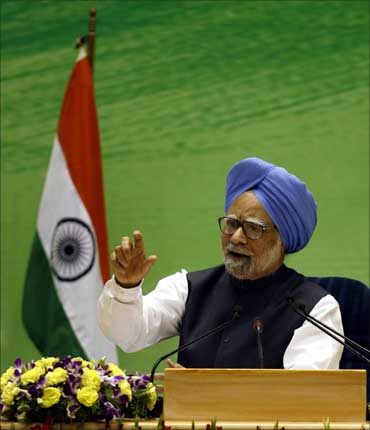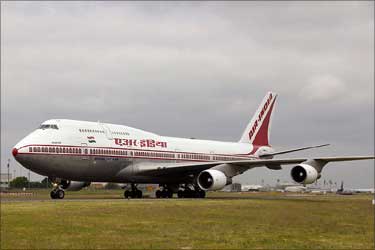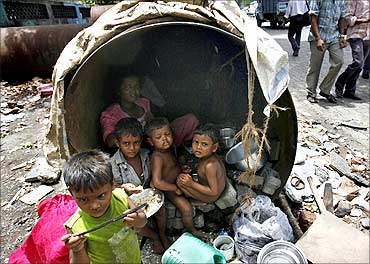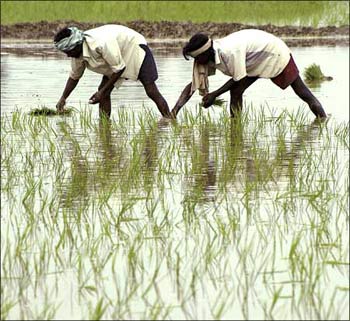Photographs: B Mathur/Reuters
While presenting the report card of United Progressive Alliance - II, Prime Minister Manmohan Singh said on Tuesday that he was looking to the year ahead with 'cautious optimism due to the uncertainties in the horizon'.
Stating that the pressure on prices was a major problem, the prime minister said that the economy would grow by 8.5 per cent in the current year.
Without mentioning the threat to growth from the European sovereign debt crisis, Singh said: "This (India's growth) is one of the best performances in the world... There are uncertainties on the horizon, but on the whole I look to the year ahead with cautious optimism."
India recorded 7.4 per cent growth in 2009-10, which was more than the 7.2 per cent projected earlier. Economic growth had slipped to 6.7 per cent in 2008-09, after four straight years of average nine per cent expansion.
Concerned over inflation, which breached double digit level (10.6 per cent) in February, the Prime Minister said the government would monitor the situation and "take whatever corrective steps are necessary to rein in" prices.
Although he sounded cautious on the developing crisis in Europe, triggered by Greece's sovereign debt crisis and bank failures in Spain, the Prime Minister said India must withdraw fiscal stimulus to boost economic growth and reduce deficit in a calibrated manner.
The government resorted to fiscal stimuli to deal with the fallout of global slowdown. "It has worked well, but now we must return to the path of fiscal prudence."
The country's fiscal deficit is estimated at 5.5 per cent of GDP this fiscal, but may come down on higher than expected revenues (nearly Rs one lakh crore) from sale of 3G telecom and broadband wireless licences.
In the Budget for 2010-11, the government increased excise duties and duties on fuel as a part of withdrawal of stimulus unveiled in the wake of the 2008 global crisis.
Govt to infuse more money in AI. Click on NEXT to read...
Govt to infuse Rs 1,200 cr more in AI: PM
Ailing national carrier Air India is being restructured and the government will infuse Rs 1,200 crore (Rs 12 billion) as additional equity in the airline, Prime Minister Manmohan Singh said on Tuesday.
The National Aviation Company of India Ltd, which runs the national carrier, "is being restructured. A decision has been taken to infuse a sum of Rs 2,000 crore (Rs 20 billion) as equity in NACIL, out of which Rs 800 crore (Rs 8 billion) has already been released," he said in the Report to the People on completion of one year of the UPA's second term in office.
He said the new Indira Gandhi International Airport in New Delhi was "soon going to be fully operational, well in time for the Commonwealth Games 2010."
The new airport has been "designed to cater to 100 million passengers per annum by 2036", he said, adding that the modernisation of 35 non-metro airports was under way.
Referring to the special developmental needs of the Northeastern states, the prime minister said the government has approved three greenfield airports for the region.
Of them, the one at Pakyong in Sikkim "is already under construction involving a cost of Rs 264 crore (Rs 2.64 billion)", he said.
The development of Tezu airport in Arunachal Pradesh at a cost of Rs 79 crore (Rs 790 million) was approved in 2009-10.
"The project is being implemented by the Airports Authority of India. The airport will be ready for operations by March 2012," the prime minister said.
UPA's plan for India's poor. Click on NEXT...
Rs 36,000 cr for basic services to urban poor, slums: PM
Image: Children eat in their make-shift home in an unused waterpipe in Mumbai.Photographs: Arko Datta/Reuters
Singh said his government will invest Rs 36,000 crore (Rs 360 billion) in programmes for providing basic services to urban poor and development of slums.
"Of the projects sanctioned under the JNNURM so far, an investment of around Rs 36,000 crore is devoted to the programmes for basic services to urban poor and development of slums."
The UPA-II aims to make the country slum-free in the next five years under the Rajiv Awas Yojana for slum dwellers.
"Construction of around 1.5 million houses for the poor and slum dwellers has been approved," the report card states.
Under RAY, affordable housing would be provided to the urban poor and they would be given property rights as well.
PM on food security. Click on NEXT...
Govt committed to enacting food security Act: PM
Image: Farmers working in a paddy field.Photographs: Reuters
The prime minister said the Food Security Law -- promised by the Congress in its election manifesto -- is under formulation and a draft would be released for public debate.
Singh, however, did not give any timeframe for enactment of the law to provide cheap food to the poor.
"The Food Security Bill is under preparation and it is proposed to place it (draft) in the public domain for scrutiny and wider consultation," Singh said.
Under the proposed Bill, the government intends to provide 25 kg of rice or wheat at Rs 3 a kg to people below poverty line.
A Group of Ministers is working out the details to make it another flagship programme of the UPA after the Mahatma Gandhi National Rural Employment Guarantee Scheme.
Consultations have been held on the proposed Bill with states and union territories and other stakeholders.
Singh also said that the UPA government is committed to giving priority to the agriculture sector. "Agriculture and the well being of India's farmers will receive priority attention."
Highlighting the achievements, the report card of the first year of the UPA government said, "The nation faced a severe drought in 2009. The government approved assistance amounting to Rs 4,806 crore (Rs 48.06 billion) from the National Calamity Contingency Fund to help mitigate the effects of the drought".
Almost half of the country was affected by last year's drought-- the worst since 1972 -- resulting into a massive production loss of foodgrains, which dipped to 218.19 million tonnes in 2009-10 from 234.47 million tonnes a year-ago.
"Various measures were taken to deal with the (drought) situation...The impact of drought on crop production was mitigated," the report said.
Introduction of nutrient-based subsidy policy for all fertilisers other than urea and cheap farm credit were other major highlights of last year. NBS aims to balance use of fertiliser and ensuring soil health.
During April 2009 to January 2010 period, farm credit worth Rs 266,000 crore (Rs 2.66 trillion) was disbursed. The target for the entire last fiscal was Rs 325,000 crore (RS 3.25 trillion).
The government said it provided additional one per cent subvention to those farmers who repay their loan on time in the last fiscal. The effective rate was six per cent for them.
The report said that Rs 3,761.43 crore (Rs 37.61 billion) were released during 2009-10 under the Rashtriya Krishi Vikas Yojana.
"Due to interventions under the National Horticulture Mission, production of fruits, vegetables and spices has increased by 25.6 per cent, 22 per cent and 11.9 per cent respectively during 2009-10 over 2005-06," it said.
PM on the shipping sector. Click on NEXT...
PM welcomes private participation in shipping sector
Singh invited private sector participation in the development of the shipping sector, considered critically important for economic progress.
The government, on its part, is also taking various steps to clear the bottlenecks being faced by the port sector, Singh said after dedicating the Pipavav Shipyard, an integrated ship-building facility on the Saurashtra coast of Gujarat, to the nation.
"We welcome private sector participation in major ports to access much needed funds and technical and managerial expertise," he said.
"I have often said India is destined to be a major trading nation of the world and if India is destined to be a major trading nation of the world, I think shipping, ship-building and management of our ports assumes great importance in our scheme of development planning," Singh said.
The shipyard has been developed to have one of the largest dry dock and wet dock facilities in the world, with state-of-the-art technology which can be used for construction of vessels relating to the oil, gas and defence sectors.
"I hope this modern facility will set new benchmarks in quality and efficiency for our country," Singh said, adding that the ship-building industry can have a multiplier effect on economic output and also in terms of its contribution to the generation of employment.
Lauding the efforts of the ministry of shipping for taking steps for the development of the sector, the prime minister said, "Our government has taken many steps to develop this sector."
The National Maritime Development Programme envisages investment of more than Rs 100,000 crore (Rs 1 trillion), he said, adding this modern facility will set new benchmarks in quality and efficiency for India.






article